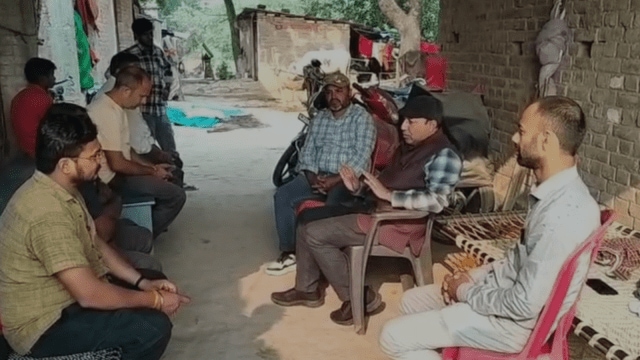Rabies scare grips UP village after residents eat prasad made from milk of cow that died from ‘dog bite’
Over a hundred villagers have taken one rabies shot. The Health Department has also set up a special medical camp to counsel families.
 A suspected rabies case in a village cow triggered fear after its milk was used in prasad, prompting 150 villagers to take precautionary anti-rabies shots. (Express Photo)
A suspected rabies case in a village cow triggered fear after its milk was used in prasad, prompting 150 villagers to take precautionary anti-rabies shots. (Express Photo) For the past four days, nearly 150 residents of Ramdeeh village in Uttar Pradesh’s Gorakhpur have been rushing in panic to get anti-rabies shots. The reason? They had eaten puja prasad (chana amrit), made from the milk of a village cow that died on Saturday evening — ostensibly from a dog bite.
Following the villagers’ distress, the Health Department on Monday set up a special medical camp to counsel families, assess risks, and reassure the community amid rising fear and confusion. Ramdeeh is a village with a mixed population of about 3,000 people.
Speaking to The Indian Express, village pradhan Anil Kumar said about a week ago, a cow belonging to his relative, Dharmendra Gour — who works in a private firm in Gorakhpur — suddenly fell ill. “Dharmendra called a veterinarian. After examining the cow, the doctor said it appeared to have been bitten by a dog and that the rabies infection had spread through its body,” explained Anil, who is serving his first term as pradhan.
He added that the veterinarian also recorded a video of the cow and shared it with his senior. After reviewing the video, the senior doctor confirmed that the animal was likely suffering from rabies and warned that it would soon start showing abnormal behaviour and might not survive.
“The doctor advised Dharmendra and others present that anyone who had consumed the cow’s milk should immediately take anti-rabies injections, before the infection — if any — could spread. The doctor also warned that once rabies develops, there is no cure,” the pradhan said.
He said a meeting was called to discuss the situation. That’s when it dawned on the residents that milk from the same cow had been used to prepare prasad during two puja ceremonies held on October 29 and November 2. “The milk was added to the prasad because it is considered shubh (auspicious),” the pradhan explained.
Dharmendra had no idea when the cow might have been bitten by a dog, said the pradhan.
“Once the animal began displaying abnormal behaviour, panic spread in the village. People became frightened and started rushing to the PHC in Uruwa — a few kilometres away — to get anti-rabies doses. Those who had consumed the cow’s milk or eaten the prasad are getting the shots. So far, nearly 150 villagers have received the first dose,” he said.
Since no one knows exactly when the cow was bitten by the dog, villagers who had consumed its milk as far back as three to six months ago are also coming to the PHC.
When contacted, Dr Jai Prakash Tiwari, medical officer at the PHC, said the villagers were taking anti-rabies doses out of fear that they might have been exposed to the infection. He clarified that none of them have shown any symptoms. “Locals told us that the doctor who examined the cow had advised them to take the rabies vaccine as a precaution, so they are following that advice,” he said.
Tiwari added that so far, around 130 villagers across all age groups have taken the first dose of the rabies vaccine. They were vaccinated in two batches, all of them have received the first of the three required doses.
Asked if a person can contract rabies by consuming the milk of a cow bitten by a dog, Tiwari said, “So far, there is no evidence that drinking the milk of such an animal causes rabies. However, it is also not possible to say with complete certainty that it can never happen.”
He added that there is still no laboratory confirmation to prove that the cow was actually suffering from rabies.
Tiwari said a medical camp is being organised in the village today to counsel residents and reassure them. “We want to explain to them that they should not panic unnecessarily.”
When asked whether the PHC had enough anti-rabies vaccines for the residents, Dr Tiwari said they maintain a substantial stock. “Our area reports many dog-bite cases throughout the year, so we keep a large quantity of rabies vaccines available.”







